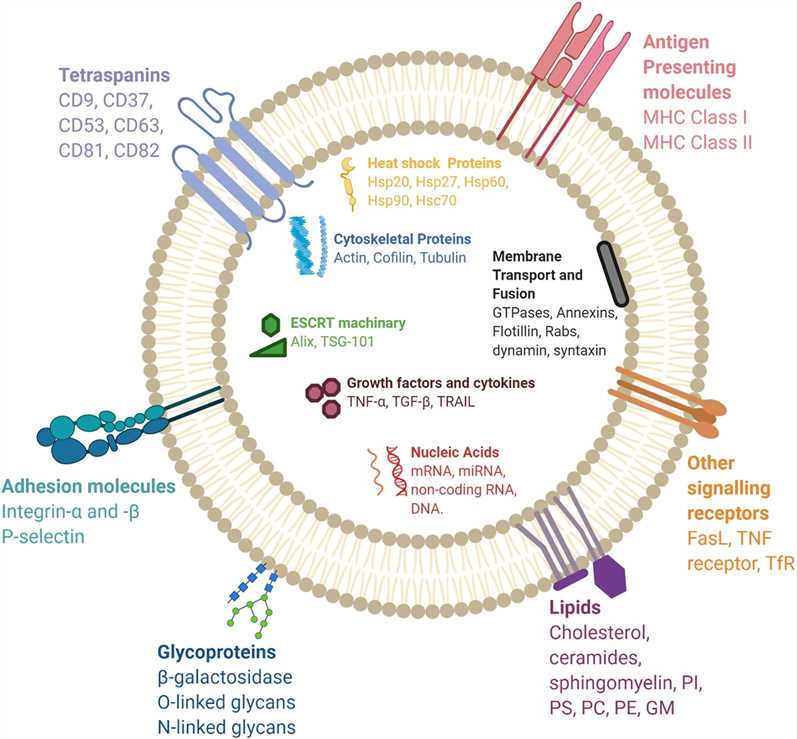Exosomal Surface Marker based Exosome Characterization Services
Overview Services Features FAQs
Overview
Why Exosome Characterization Is Important?
Exosomes are small cell-derived vesicles of 30–150 nm that are present in many and perhaps all biological fluids. Exosomes carry various molecular constituents with their origin cells, including proteins, lipids, mRNAs, and microRNAs (miRNAs). Depending on the cellular origin, exosomes recruit various cellular proteins that can be different from the plasma membrane including major histocompatibility complex molecules, annexins, flotillin, Alix, TSG101, integrins and tetraspanins (CD9, CD37, CD53, CD63, CD81, CD82 and CD151), and they are enriched in raft-lipids, such as cholesterol, ceramide and sphingolipids. Recently, an increasing number of exosomal proteins have been found to be potential biomarkers for a variety of diseases including cancer as well as liver and kidney diseases. It is essential to investigate the release of exosomes from cell and characterize the exosomal markers. This can be achieved using a panel of routine techniques such as transmission electron microscopy (TEM), nanoparticle tracking analysis (NTA), multi-colour flow cytometry, ELISA and Western blotting, as used in the present study.
Empowered by leading technologies as well as years of experience in this field, Creative Biolabs has successfully launched an innovative exosome characterization platform for investigating the release of exosomes and exosomal markers value.
 Fig.1 Composition of exosomes.1,2
Fig.1 Composition of exosomes.1,2
Services
Exosomal Surface Markers-based Exosome Characterization Services
Exosomes present novel therapeutic strategies. Therefore, develop exosome characterization is required for investigating the release of exosomes and exosomal markers value. Creative Biolabs offers robust services to fulfill the demands.
1) Exosome Characterization via Nano-Flow Cytometry
Using an optimally configured nano-flow cytometry, we provide service to analyse and sort exosomes based solely on the presence of endogenous membrane constituents. For example, the iconic exosome surface transmembrane proteins CD9, CD63, and CD81.
2) Exosome Characterization via Western Blotting
As there are no exosome specific markers, proteins enriched in exosomes, from all different cellular origins, are commonly used for exosome detection. Thus, depending on the origin cells the markers for detection may vary. Western blotting is a powerful and commonly used tool to identify and quantify a specific protein in a complex mixture.
3) Exosome Characterization via ELISA
ELISA is a patented double sandwich ELISA assay for quantitative and qualitative analysis of exosomes. The quantification and characterization of exosomes proteins are followed by the use of appropriate detecting antibodies to detect the exosomes associated antigens, which can be generic or cell-specific exosomes.
Features
-
Highly efficient
-
No investment for instrument
-
Feasible for multiple marker analysis
-
Best after-sale service
With the help of our well-established technologies and experienced scientists, Creative Biolabs provides customized exosome characterization service for customer samples. We provide very flexible options for each specific case, making it accessible to all kinds of research and industrial customers. Besides, we are open to discussions. Please contact us for more information.
FAQs
Q: Which exosome surface proteins can be detected? Can you detect exosome surface proteins specified by the client?
A: Our exosome surface protein analysis service utilizes nanoparticle flow cytometry, Western Blotting, and ELISA techniques. These technologies allow for the accurate and reliable detection of exosome surface markers such as CD9, CD63, and CD81. In addition, we can also detect any other potential surface proteins based on the client's specific requirements. Please provide detailed information about the target protein, and we will offer a detection plan and quotation accordingly.
Q: How to choose the appropriate detection method (nanoparticle flow cytometry, Western Blotting, ELISA)?
A: This depends on your specific research needs:
-
Nanoparticle flow cytometry is ideal for rapid analysis of exosome surface proteins and their subpopulations.
-
Western Blotting is suitable for qualitative analysis of exosome surface proteins.
-
ELISA is an ideal choice for the quantitative detection of specific proteins, providing accurate exosome protein concentration information.
Q: What information is included in the test results?
A: Our report will include qualitative or quantitative results of exosome surface proteins, depending on the method you choose. The report will also provide experimental conditions and analytical data to ensure you have a comprehensive understanding of the test results.
References
-
Gurung, S.; et al. The exosome journey: from biogenesis to uptake and intracellular signalling. Cell Communication and Signaling. 2021, 19(1):47.
-
Distributed under Open Access license CC BY 4.0, without modification.
For Research Use Only. Cannot be used by patients.
Related Services:

 Fig.1 Composition of exosomes.1,2
Fig.1 Composition of exosomes.1,2









